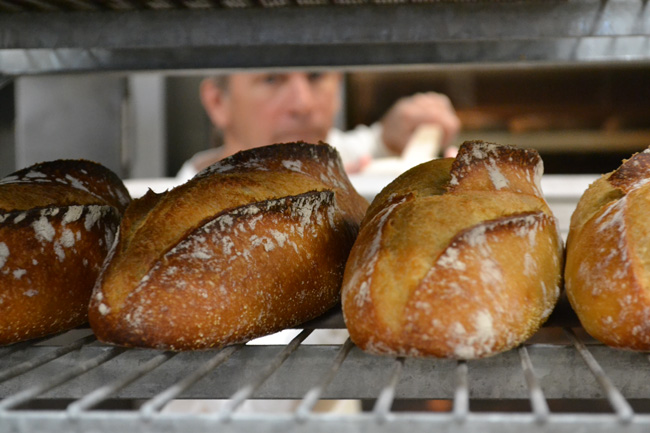
We made our trek to Collegeville just as the sun was starting to rise. The sky ran from pink to orange to yellow above the barns and silos of central Minnesota, and newly frosted birches framed the hilly road to the bakery. There, Steve Nelson had already been at the ovens for a good five or six hours.
Collegeville Artisan Bakery in St. Joseph has kept a low profile in its 10-plus years of business, and that’s just how owners Nelson and Mary Ann Friederichs like it. After all, the front door of their bakery stands not 12 paces from the steps of their 25-year-old farmhouse in the middle of the woods. This is where they raised their two daughters, and for about five years now, it’s where they turn out small batches of croissants and crusty artisanal breads.
“There are other things that we could do,” Friederichs says, “but we choose to focus on those two things and do them well.”
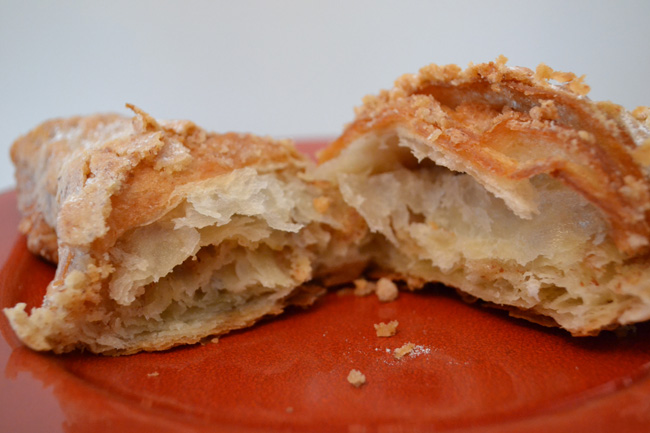
Judging by their farmers market following alone, it seems they’ve done just that. In Maple Grove, their signature almond croissants ($3.50) keep regular customers coming back for more. Part of what sets these croissants apart from others of the same variety is their total lack of refinement. They’re these pale blobs with a vague crescent shape and a light dusting of powdered sugar; there are no sliced almonds, no delicate golden layers to be seen. But damn, they’re good — for a couple of reasons. For one thing, they are nothing more than repurposed butter croissants ($1.75), and Nelson has a sturdy version of those, with a strong, egg-rich crust around a tangy, super-moist interior. That’s important when the thing goes back into the oven with from-scratch almond cream spread through the middle and sheathed across the top. That almond shell keeps the already-moist croissant from drying out during its second bake, and, incidentally, hides the croissant itself from view. The final product is thick and heavy, like a sweet, buttery almond sandwich.
Step into the bakery while it’s in production, and the croissants are easy to miss for the racks of cooling artisanal loaves. Behind them, Nelson is pulling more bread off the hot stone of his Italian deck oven. He scores ten more loaves, loads them onto an open deck, and releases a blast of steam that helps the bread expand to its fullest before a dark, crisp crust forms. This is Nelson’s element, but he didn’t find it until he was into his late 40s.
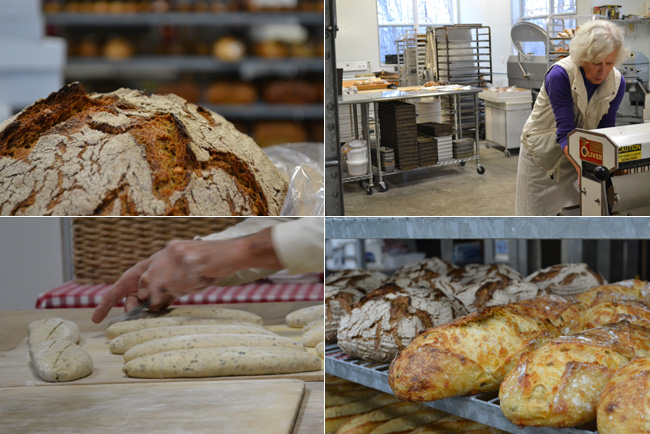
Before he started baking professionally, Nelson was part-owner of the Clearwater Travel Plaza. What lit the fire, he tells us, was his time at the National Baking Center at the Dunwoody Institute in Minneapolis. “It was just a fluke that I took that two-week class,” he says. The class was fundamentals of bread baking taught by baking master Didier Rosada. After a string of classes on breads, croissants, and pastries, Nelson did some baking around the country before working at a handful of Twin Cities spots including Turtle Bread, Patrick’s, and Wuollet.
“It was one of the more difficult things I ever had to do — going from having a couple hundred employees to learning a new craft,” he says. When Nelson began to think more about a retail space, it was Friederichs who suggested starting with farmers markets.
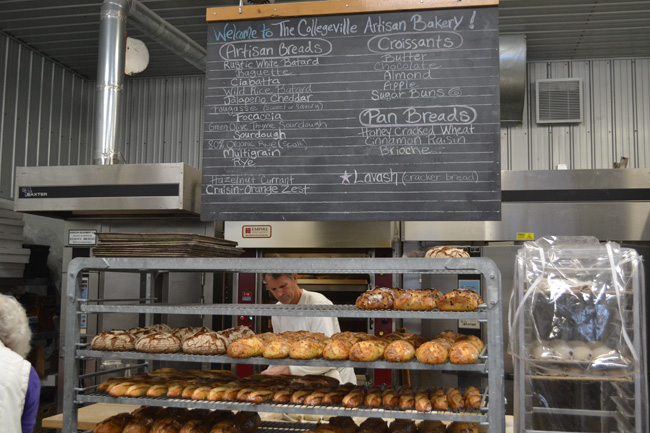
“That was the best thing we could have done,” Nelson says. Then he turns to Friederichs: “And now you live the lavish life of a …”
“Bakery wench,” Friederichs laughs. The two joke about power dynamics and long hours spent together, but they know they’re lucky.
“We have the luxury to be able to choreograph the operation, customize it to what we want. Not everyone has that good fortune,” Nelson says.
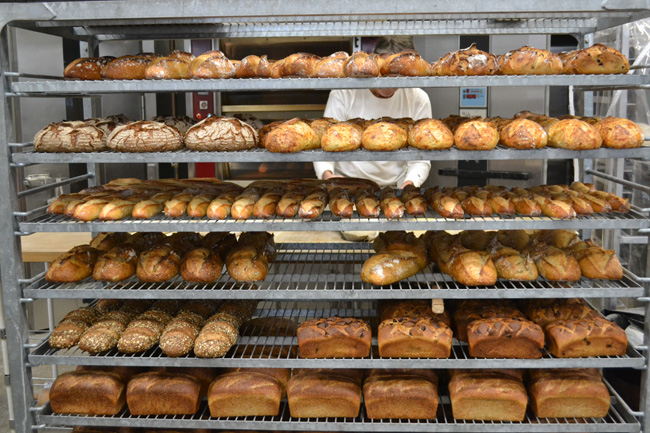
Friederichs takes us through the selection on the cooling rack and stops at a hazelnut currant loaf ($5), with its tangy buttermilk crumb interrupted by bits of nutty crunch and sweet currant. She advises us to toast this one and top it with cream cheese. “I start eating one slice and immediately put another into the toaster,” she says.
Then there’s the green-olive thyme sourdough ($6), an oblong loaf that’s almost as satisfying to break into as it is to eat. It crackles like firewood as the bread knife descends, and the blade works through it with the sound of a saw through wood; with all the racket, it’s surprising how pillow-soft the interior is. The green olives are small and well spaced, bringing salty contrast to the sour bread. Even to those of us who don’t normally care for green olives, it is delicious, especially when toasted. If you’re not convinced, the jalapeno cheddar loaf ($5) is another smashing hit hot off the coils.
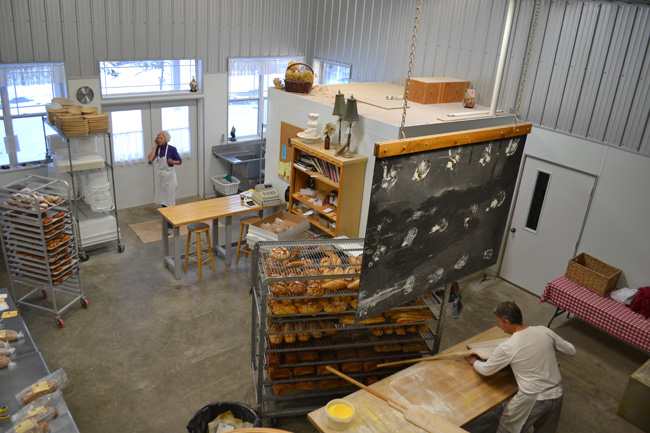
Nelson takes particular pride in the breads that require a more demanding process. He loves the creamy crumb and irregular hole structure of ciabatta ($5), whose dough develops strength through a punch-and-fold technique. And during a baking stint in Spalt, Germany, he learned to forge an 80-percent rye bread ($6.50) that he says gives him great joy to make. The dense, round juggernaut of a loaf has serious mass, and is chock-full of anise, coriander, and cumin. It’s more of an acquired taste compared to, say, the crowd-pleasing honey cracked wheat ($5.50), a pan bread made slightly sweet by honey from nearby Whiskey Creek Honey Farm.
With the farmers market season slowing down, Collegeville Artisan Bakery has entered what Nelson calls the “long, slow exhale” of winter. In the coming months, he and Friederichs keep busy with their wholesale accounts at local markets and cafes; that’s where most of today’s breads and croissants will go. When everything has been packaged and delivered, the bakers will clean and prep the kitchen for tomorrow, when a private group will come for a class on breadmaking. They’ll gather beneath the twinkle lights strung up above the countertops, and they’ll learn about fermentation and baker’s percentage. They’ll bake focaccia, baguettes, and ciabatta from start to finish, and they’ll lunch on homemade soup and bread in the house.
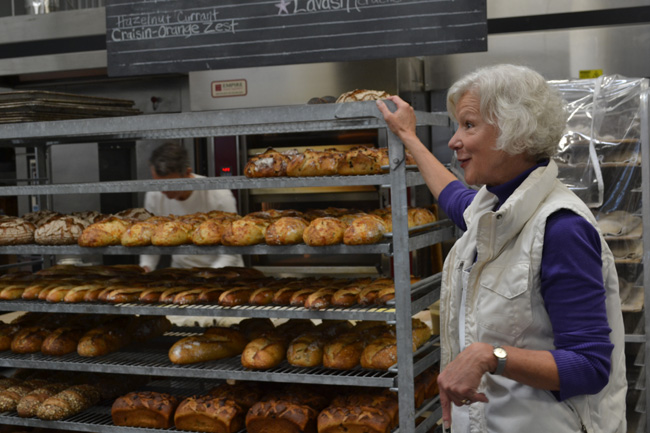
Several versions of this class ($95–$175) take place throughout the winter and cover topics ranging from croissants and Danishes to German strudel and Bavarian pretzels. Nelson tells us people come from all over, from all walks of life, for a daylong class in the woods. “It’s a nice homey, folksy feel,” he says.
As the bakery settles into its off-season, hopeful customers are encouraged to call or check the schedule on the website before coming in. Readers in the Twin Cities can do the same to find out when Collegeville Artisan Bakery will be at the indoor farmers market in the Maple Grove Community Center.
But there’s a reason why folks have made the trip all the way to Collegeville — in the dead of winter, mind you — from Minneapolis and Fargo and Bemidji. It’s a taste of something simple — of warm bread on a cold winter morning — that’s made even better when found by way of snowy back road. And there’s something so perfectly Minnesotan about that.
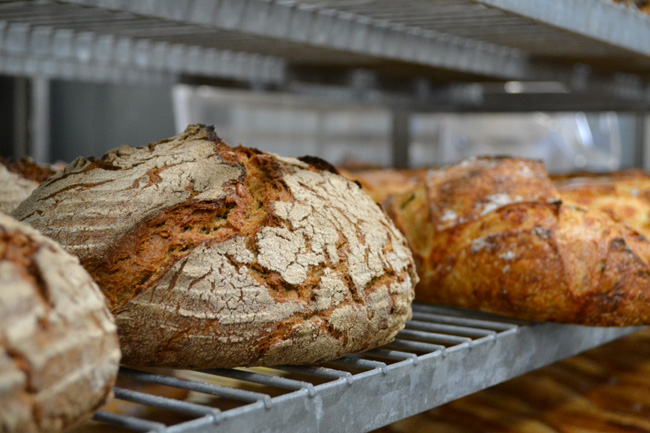
Collegeville Artisan Bakery
15349 County Road 51
St Joseph, MN 56374
320.309.6282
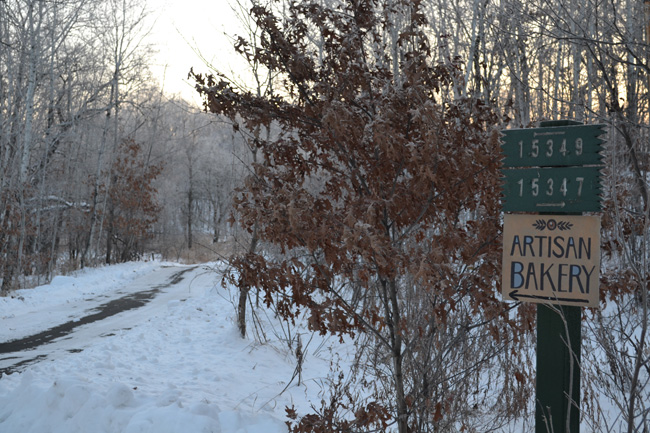

Cool story. I’d love to take one of their baking classes.
I’ve tried to make croissants in the past and can’t get it right – Do you have a class that could help me? Yours look beautiful :-)